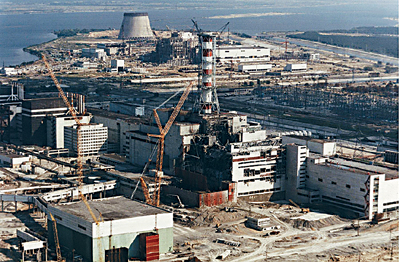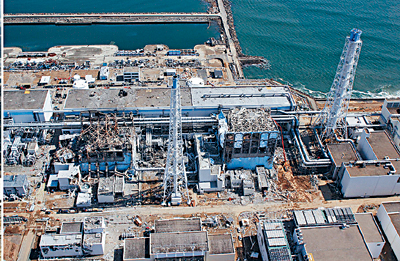
Chernobyl
Chernobyl (n.切爾諾貝爾) is regularly labelled (v.稱為) "the world's worst nuclear (adj.核子的) accident" - and with good reason.
A working (adj.正在運作的) reactor (n.反應堆) caught fire, explosively (adv.爆炸地). Radioactive (adj.放射性的) debris (n.廢物) was sent 30,000 feet into the air - the height at which airliners (n.大型客機) conventionally (adv.慣常地) fly.
Some of that debris came down thousands of kilometres away, in concentrations (n.濃度) strong enough to prohibit (v.使不能夠) the eating of meat and the drinking of milk produced locally (adv.在當地).
The upgrading (n.升級) of Japan(n.日本)'s Fukushima (n.福島) incident (n.事故) to a level seven - the maximum - on the International (adj.國際的) Nuclear and Radiological (adj.放射學的) Event Scale (INES) (n.“國際核能事件分級表”) puts it on a par (n.水平) with Chernobyl.
However, Paddy Regan (n.雷根), professor (n.教授) of physics at the UK(n.英國)'s University of Surrey (n.舒梨) said: "The amount of radiation (n.輻射) release (n.泄漏、排放) is a lot less, and the way it's released (v.泄漏、排放) is very different.
"The Chernobyl fire was putting lots of radioactive material into the atmosphere (n.大氣(層)) and taking it over large distances; here, there have been a couple (n.三數次) of releases where they've vented (v.排放) [gas from] the reactor, and then released some cooling water."
(BBC, April 12)
切爾諾貝爾經常被稱為“世界上最嚴重的核意外”——而且理應如此。
一個正在運作的反應堆火,並發生爆炸。放射性廢物散發到三萬呎高空——大型客機慣常飛行的高度。
有些廢物在數千公里以外降下,濃度很強,足以導致當地生產的肉類不能食用,牛奶無法飲用。
日本福島事故升到第七級,亦即“國際核能事件分級表”的最高級,令它與切爾諾貝爾不相上下。然而,英國舒梨大學物理學教授雷根說:“輻射泄漏的份量少得多,而泄漏的方式也非常不同。
“切爾諾貝爾發生火災,把大量放射性物質釋放到大氣層,並飄往遠方;現在只有三數次泄漏,他們自反應堆排放氣體,然後排放一些冷卻水。”
(英國廣播公司,四月十二日)
閱讀指引
1. working (adj) /'w?捵:k?笈?痯/,
WORK-king 有工作的、正在運作的
解讀:動詞work解作工作、運作,而現在分詞working則指有工作的、正在運作的,例如文中的working reactor是正在運作的反應堆,又例如working mother是在職母親;working也可指工作上的,例如working hours是工作時間,working conditions是工作環境。
2. debris (n) /'de?笈bri:/,DAY-bree 廢物、殘骸
解讀:debris借用自法文d?晹bris,因而字母e上方可加上一撇,但不加也很常見;此字常指交通意外後的殘骸,例如debris of the plane crash是飛機失事的殘骸;debris的s不發音,而此字也可讀作DEB-bree,以至da-BREE;留意debris不可數。
3. vent (v) /vent/,VEN-t 排放、發泄
解讀:vent的受詞可如文中用gas,而此字更常指發泄、表達情緒,例如vent one's feelings是表達自己的情緒,而vent one's anger / fury / rage / wrath則是發泄自己的憤怒/暴怒等,vent one's frustration則是表達自己的不滿。

Fukushima






